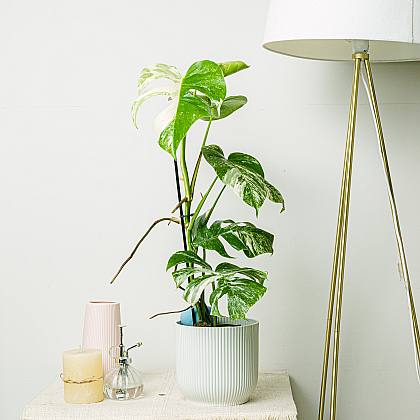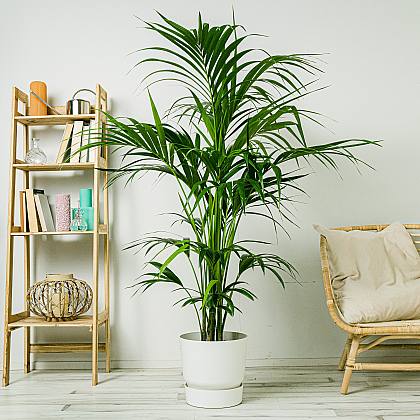The best places for your orchids: find the ideal place
Los mejores lugares para tus orchideas: Encuentra el lugar ideal. Orchids are fascinating plants that can thrive in a variety of environments. In this article,...
Los mejores lugares para tus orchideas: Encuentra el lugar ideal. Orchids are fascinating plants that can thrive in a variety of environments. In this article, we'll look at which location is best for your orchids. We will look at the lighting and temperature requirements both indoors and outdoors. We also share tips for indoor gardening and discover exotic places where orchid lovers can find new species and varieties. Whether you're a beginner or an experienced gardener, this article will help you find the perfect location for your orchids and optimize their care.
The right location for your orchids: light and temperature
The right location is an important factor in the well-being of your orchids. light and temperature play a decisive role here. Orchids need a balanced amount of light, but direct sunlight should be avoided as this can cause leaf burns. A bright location with indirect light is ideal. You can also place your orchids in front of the window, but make sure they are not exposed to the blazing midday sun.
Temperature is also an important factor in your orchids thriving. Most orchid species prefer temperatures between 18 and 24 degrees Celsius during the day and slightly cooler temperatures of around 15 to 18 degrees Celsius at night. It is important that the temperature differences between day and night are not too great, as this could damage the plants.
You should also make sure that your orchids are not near drafts or heat sources, as this can cause extreme temperature fluctuations. Relative humidity also plays a role. Orchids like high humidity, so it can be helpful to spray them regularly or place them on a gravel bed filled with water.
By giving your orchids the right location with enough light and an optimal temperature, you can ensure that they grow healthy and beautiful.
Orchids in nature: where do they grow best?
Orchids are one of the most beautiful plant species that exist. They grow in nature in many different places, but there are some conditions that they need to thrive optimally. One important thing to keep in mind when it comes to orchids in nature is location. Many species of orchids grow in the tropics and require a lot of light to grow. Therefore, they should be planted in a place where they get plenty of sunlight. It is also important that they are planted in a place where they are protected from strong winds and rain.
Another important thing when placing orchids in nature is the type of soil. Orchids prefer soils with plenty of moisture and nutrients. The soil should also be well-drained to avoid waterlogging. In nature, orchids often grow on trees or rocks and absorb nutrients from the air.
Another factor to consider when it comes to orchids in nature is the climate. Since many orchids grow in the tropics, they require a humid climate with high temperatures. In regions with cooler climates, orchids can still grow, but it can be harder to create the right conditions.
Overall, orchids are a very diverse type of plant that can grow in many different environments. However, when trying to grow orchids in nature, it's important to focus on the location, soil, and climate to ensure they
Indoor Gardening: Creating the Perfect Environment for Orchids
When gardening indoors, it's important to create the perfect environment for orchids. A good room temperature and sufficient light are crucial for the healthy growth of these exotic plants. Orchids prefer a temperature between 18 and 24 degrees Celsius, although it can be a bit cooler at night. It is important to protect them from drafts and sudden changes in temperature. In terms of light, orchids need a lot of brightness, but direct sunlight should be avoided. An east or west window is ideal, as it gives them enough indirect light. If the window faces south, you should use curtains or blinds to filter the light. For rooms with little daylight, special grow lights can be used to meet the light needs of orchids.
Humidity also plays an important role in the care of orchids indoors. These plants prefer high humidity of about 50 to 70 percent. To achieve this, you can place a humidifier or water bowls near the orchids. Another option is to place the pots on trivets filled with gravel and fill them with water so that evaporation increases humidity.
When choosing the right substrate for orchids, you should pay attention to good drainage. A special orchid substrate made of bark or moss is ideal, as it allows excess water to drain away quickly while maintaining enough moisture.
Indoor gardening allows us to grow orchids even in rooms without a garden and enjoy their beauty all year round. By creating the perfect environment — with the right temperature, enough light, and optimal humidity — we can ensure that our orchids grow healthy and splendid.
Orchids in the garden: tips for outdoor use
Orchids are among the most popular houseplants, but they can also look beautiful in the garden. If you're thinking about planting your orchids outdoors, there are a few things to keep in mind. First of all, it is important to choose the right location. Orchids prefer a semi-shaded to shady location with adequate humidity. Avoid direct sunlight and make sure the soil is well-drained to allow water to drain away. A good way to achieve this is to use pots or planters with holes in the bottom.
Another important factor in orchids thriving in the garden is proper watering. Orchids need to be watered regularly, but make sure the soil doesn't get too wet. A good rule of thumb is to only water the soil when it feels dry to the touch. It is also recommended to place a drainage layer of gravel or clay balls on the bottom of the planter to avoid overwatering.
Finally, you should not neglect the care of your orchids in the garden. Regularly remove dead leaves and flowers and fertilize the plants every few weeks with a special orchid fertilizer. If you follow these tips, you will surely enjoy your orchids
Orchid Care for Beginners: The Right Location Makes the Difference
Orchid Care for Beginners: The Right Location Makes the Difference
Proper placement is an important factor in orchid care. It is important to find the right location for the plant to thrive and stay healthy. Orchids usually prefer a bright location, but should be kept away from direct sunlight as this can cause leaf burns. Indirect lighting is ideal for promoting plant growth.
Temperature also plays an important role in orchid placement. These plants need temperatures between 20 and 25 degrees Celsius during the day and between 15 and 18 degrees Celsius at night. A constant temperature is also important, as strong fluctuations can put a strain on the plant.
When placing orchids, attention should also be paid to the humidity. Orchids prefer high humidity, so it is advisable to place them near bathrooms or kitchens. It is also possible to place a bowl of water next to the plant or spray the leaves regularly with water to increase humidity.
In conclusion, a suitable location is essential for the growth and health of orchids. It is important to pay attention to light, temperature, and humidity so that the plant thrives optimally. With these simple tips, even beginners can successfully care for their orchids and enjoy them for a long time.
Orchids in different rooms: from the living room to the office
Orchids are a popular houseplant that can thrive beautifully in various rooms, such as the living room or office. They give an exotic and elegant atmosphere to any room. In order for your orchids to grow optimally, it is important to choose the right location. In the living room, orchids should be placed near a bright window to get enough light. However, direct sunlight should be avoided as it can burn the leaves. In the office, orchids can be placed on a desk or shelf, as long as they receive sufficient indirect light.
Temperature also plays an important role in orchid growth. Most orchid varieties thrive at temperatures between 18 and 24 degrees Celsius. Make sure that the room temperature does not fluctuate too much and avoid drafts.
To encourage the growth of your orchids indoors, you should also pay attention to humidity. Orchids prefer high humidity, around 50-70%. If the air is too dry, you can use a humidifier or place a shallow bowl of water next to the plant.
Remember to water your orchids regularly and pay attention to their needs. It's best to use stagnant water and dip the roots in it for a few minutes. Make sure that excess water can drain off to prevent waterlogging.
By choosing the right location for your orchids in different rooms and meeting their needs, you can ensure that they grow healthy and beautiful. Have fun gardening with these fascinating plants!
Exotic places for orchid lovers: discover new species and varieties
Exotic locations offer an unforgettable experience for orchid lovers who are looking for new species and varieties. These places, which are usually located in distant lands, offer a rich variety of orchid species found in nature. These exotic locations include the Andean region in South America, tropical forests in Southeast Asia and Africa, and some islands in the Pacific. These places have high humidity and temperatures that are ideal for orchid growth. Visitors can admire rare orchid species such as Miltonia spectabilis or Paphiopedilum Rothschildianum and be enchanted by their beauty.
Some of these exotic places also have special orchid gardens where visitors can see a variety of orchid species and varieties. These gardens often offer guided tours and workshops to teach visitors more about orchid care. Here, orchid lovers can also discover and buy rare varieties such as the Vanda Miss Joaquim or the Cattleya aclandiae.
However, it is important to note that buying orchids in exotic locations can present some challenges. Transporting orchids over long distances can be difficult and there is a risk that they will be damaged or not thrive well in their new location. It is therefore advisable to be well informed and only buy from reputable dealers.
Overall, exotic places offer orchid lovers a unique opportunity to discover new species and varieties and deepen their passion for these beautiful plants.
Orchids are fascinating plants that can thrive in a variety of environments. Whether you're growing them indoors or outdoors, it's important to find the right location for them. You'll want to ensure proper lighting and temperature indoors, while outdoors protection from strong winds and direct sunlight is important. A beginner should focus on a location that meets the orchid's needs and provides it with optimal growing conditions. From living rooms to offices, there are many spaces where orchids can thrive and create a pleasant atmosphere. For those who love to explore exotic places, there are always new species and varieties to discover. However, there is much more to learn and explore when it comes to orchid care.
The world of orchids offers endless possibilities for amateur gardeners and plant lovers. Experimenting with different places and environments can lead to wonderful results. Maybe you've already found your perfect environment for your orchids, or maybe you want to try more rooms. Whatever the case may be, don't forget that orchid care is an ongoing process that requires patience and attention.
Hit the road and explore the world of orchids! Discover new species and varieties, find the ideal location for your plants and share your experiences with others. The variety of these fascinating flowers will never cease to surprise and inspire you. In which room will you bloom your orchids next?


